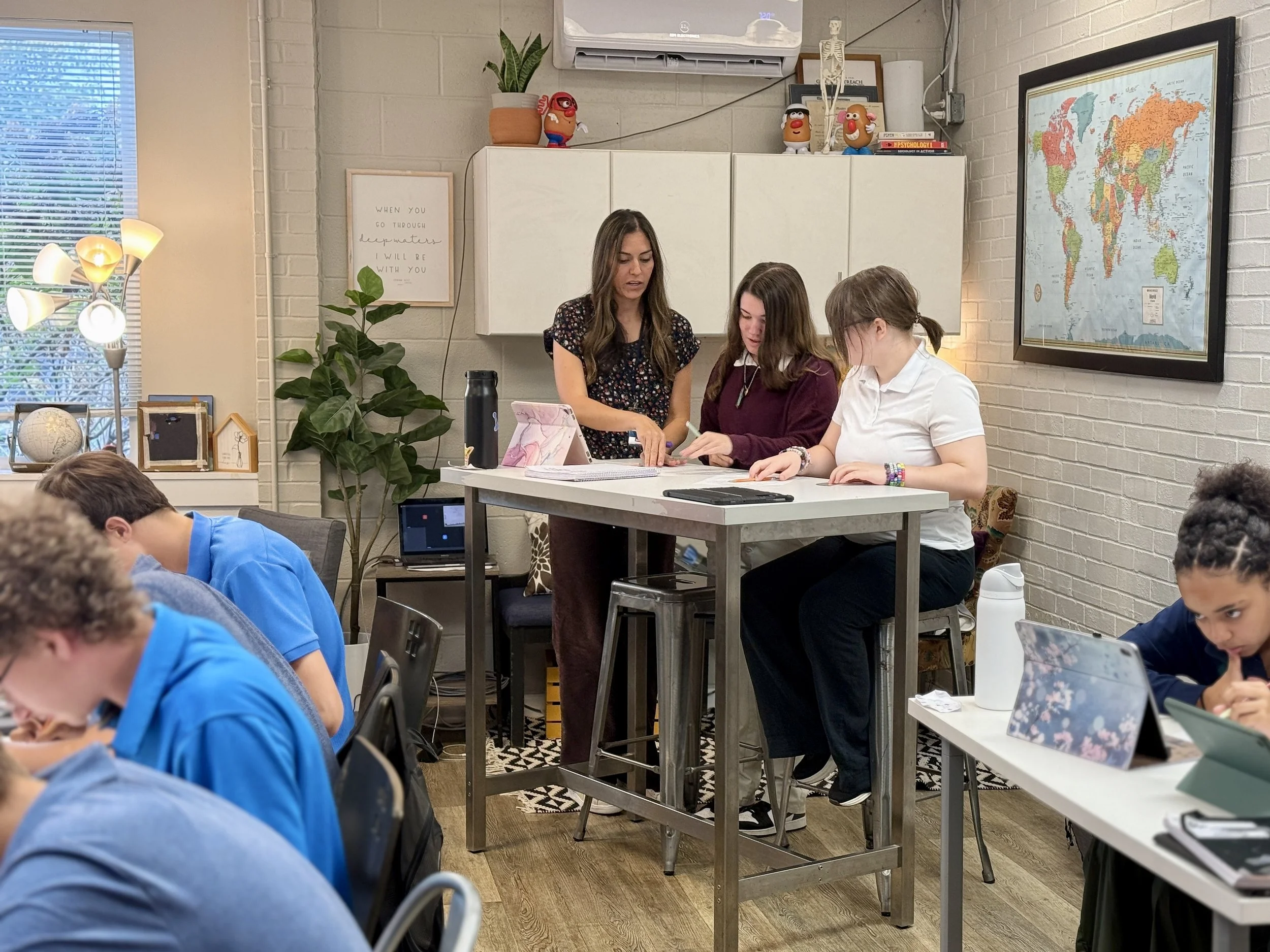Why Students Need to Memorize Math Facts
And Why It’s Not “Rote”. It’s Foundational.
According to the NAEP (often called the Nationʼs Report Card), 61% of U.S. 4th graders scored below proficiency in mathematics in 2024. That number rises to 78% by 8th grade. As leaders, educators, and parents, we must be asking the question: What is causing this math crisis?
Over the past two decades there has been a prevalent misconception in many education circles, that memorizing math facts (those simple addition, subtraction, and multiplication facts that we want at our students’ fingertips) isn’t necessary. That students don’t need to know the multiplication table because they can always use other strategies… or just grab a calculator.
Though the solution to the math crisis is not singular, one thing is clear: this philosophy has left our students wildly unprepared. Modern education research is showing us the real story – that students who have memorized their math facts into their long-term memory learn math faster, understand it more deeply, and feel more confident doing it. Memorizing the facts isn’t frivolous busywork, it’s completely foundational to a student’s mathematical competence and long-term success.
The Power of Long-Term Memory
When students learn math (or anything for that matter), that learning starts in the working memory. This is the part of the brain that handles information that is coming from “outside” the learner and must be consciously thought about and processed. The working memory is extremely limited! Once we exceed the limits of 3-5 pieces of information, the cognitive load becomes too heavy and learning does not take place.
In contrast, long-term memory is virtually limitless. It can hold an incredible amount of information, and the more a student has stored there, the easier it is for them to learn new things without being overwhelmed. This is where we want the math facts stored! It becomes an incredible tool that the student can access instantaneously while problem solving. When math facts are stored in long-term memory and can be recalled automatically, they place no additional burden on working memory — the mental workspace where new learning and problem-solving occur — and actually free up cognitive resources, making that learning more effective.
In short, these two memories (working and long-term) work together. The things stored in long-term memory help students think critically, creatively, and effectively about the information that has entered the working memory. When students know their multiplication facts “by heart”, they have more brainpower to attend to the problems in front of them.
Knowing Math Facts Frees Working Memory (and Calculators Don’t)
So, now we know that working memory is like a student’s mental whiteboard. It only has room for a few ideas at a time.
When a student knows that 7×8 = 56 instantly, that fact takes up zero space on the whiteboard because it’s already stored in long-term memory.
But if they have to stop and figure it out (“Let’s see… 7×7 is 49, so 7×8 is 49+7…”) they’ve already used limited brainpower before even tackling the actual problem in front of them.
That’s why knowing these facts is so important. It reduces the cognitive load and frees the brain to focus on complex problem-solving and creative reasoning, the kind we want them doing in algebra, geometry, and beyond (Ding et al., 2019). Automatic recall isn’t about speed for speed’s sake; it’s about accessing higher-level thinking.
But Can’t We Just Give Kids Calculators?
A calculator can’t reduce the entire cognitive load for students. In fact, relying on one adds steps: Using the device, typing correctly, interpreting the result, and deciding whether it makes sense. Each of those eats up more working-memory space and creates new chances for error.
When facts are known, students can reason fluidly. When they’re not, even basic problems can feel like wading through mud. Take the following example: When students have to factor a number in algebra, such as 48, they need to quickly know that all of their options are 4x12, 6x8, 3x16, 2x24, and 1x48. A calculator can help a student find the factor pairs, but it will be much slower, use up a lot of working memory, and the student will not be confident that they have produced all the possible factors without first checking every single number on the calculator, which is extremely cumbersome. When students haven’t committed basic knowledge to long-term memory, their multi-step problem solving remains labored.
Math Is Hierarchical – Facts Are the Bottom Rung for Later Success
Mathematics builds like a staircase. If the lower steps aren’t sturdy, students struggle to climb.
Weak multiplication fact recall hinders students in many topics moving forward:
Fractions: finding least common denominators and simplifying fractions depend on fluent multiplication and division recall.
Algebra: factoring trinomials, expanding binomials, and balancing equations all rely on multiplication fact recall. Like the example mentioned above, students factoring 48 need to quickly know that all of their options are 4x12, 6x8, 3x16, 2x24, and 1x48.
Problem solving: estimating, checking reasonableness, and spotting errors are much harder when you don’t have access to the numbers in long term memory.
In short, multiplication facts are not the destination, they’re the bridge. Without them, higher level math becomes an uphill battle.
But Isn’t Rote Memorization Bad?
You may have heard that rote memorization is bad for learning. That is only true if “rote” means memorizing without meaning or understanding. When we talk about knowing math facts, we are talking about memorizing the facts after the students have gained understanding of what the operation is, and how it works. Once the student has that understanding, they are ready to get those facts stored in their long-term memory through consistent, repeated practice. This isn’t meaningless repetition, it is strengthening of the neural pathways and paving the way for mathematical fluency. It is similar to athletes who create muscle memory after lots of repeated practice with a physical skill.
Bringing it all together
Knowing math facts doesn’t hinder understanding, it enhances it. What used to bog the student down now lets them connect to math concepts confidently, and reason effectively. When it comes down to it, helping students memorize math facts isn’t about drilling them with mindless practice, it’s about giving them access to a powerful tool. A deep well of information they can pull from at a moment’s notice. When the facts are memorized and stored in that long-term memory, students gain the capacity to do robust, complex, mathematical problem-solving.
Citations and resources for further exploration:
Baker, A. T., & Cuevas, G. (2018). The importance of automaticity development in mathematics. Georgia Educational Researcher, 14(2). Retrieved from https://files.eric.ed.gov/fulltext/EJ1194585.pdf
Ding, Y., Li, H., Liu, M., & Zhang, Q. (2019). Effects of working memory, strategy use, and single-step mental addition skills on multi-step mental addition. Frontiers in Psychology. https://doi.org/10.3389/fpsyg.2019.00148
An introduction to cognitive load theory - THE EDUCATION HUB
Written by Janae Castro
Alpha Gal: School Nutrition Addresses an Endemic Health Concern
What is Alph-Gal Syndrome?
Academy students enjoy a variety of fresh meals each week at school with menu items ranging from pork tostadas to chicken curry.
Alpha Gal syndrome is a tick bite induced allergy in which a person becomes allergic to red meat and even red meat by products such as dairy, gelatin or lard. Tennessee is considered a high prevalence area for Alpha-Gal among several other states in the souther region of the United States. Symptoms can vary from anaphylactic shock to rashes and stomach aches.
How has our program addressed this allergy?
Though for Alpha-Gal syndrome has received more press in the recent years this is not a new allergy for our school nutrition program. Over the last 7 or so years our school nutrition program has addressed a high number of students in our population with the allergy and have tried a variety of ways to accommodate them. From serving seafood, to making our homemade locally sourced turkey burgers.
For 2 years we eliminated red/mammalian animal meat from our menu completely in order to better ensure everyone had a safe meal time. During this time we were the only school in Tennessee to have created a menu specifically catering to those with Alpha-Gal. Some reports show that after some time (up to 3 years) a person with Alpha Gal can have a decreased sensitivity to the allergen. After the two year period was over, we noticed a decrease in those with the allergy and were happy to reintroduce red meat products.
Because so many students and even staff had the allergy we had to learn the in’s and out’s of the allergy. We learned to carefully curate products, check for lard or meat fats and dairy in products, and even clarify with parents about what specific items and by products their students were allergic to. This process reflects our larger aim as a school—to remain aware, informed, and relevant in all that we do. Whether it’s in the classroom, through extra-curricular opportunities, or even around the table at meals, we strive to serve our families with diligence and discernment.
How do we continue to address Alpha-Gal?
Still during the 2025-2026 school year we have some students and staff with the allergy and have chicken, and turkey options available to them. As we move into the future we continue to keep tabs on how many students have Alpha-Gal syndrome and are vigilant in terms of what products we purchase to ensure everyone experiences a safe and delicious lunch time.
Sources:
https://alphagalinformation.org/wp-content/uploads/2024/04/AGSFactSheetv6.pdf
https://www.cdc.gov/mmwr/volumes/72/wr/mm7230a2.htm#:~:text=The highest prevalences of suspected,distinct from this contiguous region
https://www.mayoclinic.org/diseases-conditions/alpha-gal-syndrome/symptoms-causes/
https://www.ccjm.org/content/92/5/311
Academy Faculty Professional Development in New York: Trip Review
This spring, a team of 17 teachers and administrators from the Academy for GOD had the incredible opportunity to attend the ResearchEd conference in New York. This professional development experience was more than just an educational event; it was a moment of collective growth, reflection, and energizing focus for our instructional team.
Written by Craig Duffy, Director of Education
This spring, a team of 17 teachers and administrators from the Academy for GOD had the incredible opportunity to attend the ResearchEd conference in New York. This professional development experience was more than just an educational event; it was a moment of collective growth, reflection, and energizing focus for our instructional team.
Research Ed is internationally renowned, with a focus on bridging the gap between research and practice in the field of education. As their name implies, each session topic was based on carefully executed research, providing a strong body of evidence to support strategies for age-old teaching challenges like memory recall, distraction, cognitive overload, and more. ResearchEd was a great fit for our mission at the Academy, allowing us to dive into research-based practices that align with both academic rigor and the deeper calling we have as Christian educators.
Academy Headmaster Corey Foster, who spearheaded the whole trip, carefully organized the team to be partnered up and spread out amongst the most relevant sessions, to maximize the benefits of this rich opportunity. Teachers at Kindergarten and lower elementary levels dove into topics like learning through play, whole body learning, and how to empower students to refocus themselves when they become distracted. Jr. High and High teachers examined research related to blocking (teaching a new concept and focusing on one thing at a time) and incorporating that with memory retrieval practices to build a strong knowledge base.
Surrounding the sessions, teachers and administrators met up for discussion on how to apply content to our Academy classrooms. Teachers shared ideas related to skill acquisition activities, while administrators discussed how our school evaluates and uses educational research. It was a wonderful and energizing moment to pause, reflect, learn and share ideas!
One teacher shared, “I want to take a moment to sincerely thank you all for the opportunity to attend ResearchEd. It was an incredibly valuable experience, and I truly appreciate the investment in my professional growth.” Another added, “This PD weekend strengthened our staff as a team and energized us to give all we have to serve our students with intentionality.”
Outside of the conference sessions, Academy Founder Gregg Garner put great care into coordinating moments of conversation and unifying experiences. From table fellowship to Creative and Performing Arts outings, to weaving through New York traffic together on bicycles, the intentional time together was unifying and energizing! The team returned refreshed and excited about finishing the year with excellence, and continuing to refine our educational endeavors.
As we reflect on this trip, I am reminded of Colossians 3:23, which says, “Whatever you do, work at it with all your heart, as working for the Lord.” This experience reaffirmed that our work in education is not just about information—it’s about transformation. We left New York equipped, encouraged, and excited to bring that transformation back to our classrooms.
We’re grateful for what this trip has meant to us as a team and to the future of our Academy students. May this be just one of many steps in our continued journey toward excellence in Christ.
Open Seats for 2025-2026 School Year
GOOD NEWS! We've accepted our first round of enrollment applications, and there are still seats available for '25-26! With new programs such as TN ESA & EFS, now is the perfect time to take advantage of a Christ-centered, private school education for your student. We've extended our application deadline to April 1st with no additional fees.
TN Education Savings Accounts & TN Educational Freedom Scholarships
The state of TN now has two education programs that could provide tuition assistance for your family, and The Academy will be a participating school in both.
The TN ESA (Education Savings Account) is currently in its second year, and we've had wonderful success with it this year as a school. If you currently hold a TN ESA, please note that it's time to renew your student's account for the '25-26 school year. ALL students must submit a renewal application in order to maintain their account into the next school year. You will need your 2024 tax information.
If you are applying for a new student for the '25-26 school year, please submit their application for enrollment at the Academy no later than April 1, 2025. Late fees will apply. Furthermore, you can apply for a TN ESA for your incoming student if they meet the eligibility requirements. Applications are now open.
The TN EFS (Education Freedom Scholarships) will be made available for the '25-26 school year per the TN DOE, as of now. The Academy fully intends to participate in this program, and we're currently waiting for next steps to get our school on board. Once that information is released, we will be passing along how you can apply. We do anticipate that families will need their tax info for their application. More info on the TN EFS HERE.
Per school policy, TN ESA holders and TN EFS recipients will not be eligible for financial assistance from the school through FACTS Tuition Assistance.
How to Achieve Excellent Made from Scratch Meals
One of the distinct characteristics of the Academy’s meal program since it began in 2015 has been made from scratch meals. Learn from our meal program coordinator, Ms. Chigumira, how this endeavor is made possible and the extraordinary benefits for our students.
Since 2015, when the Academy School Nutrition Program was launched, we have made it a priority to incorporate made-from-scratch meals. At that time, there was no additional funding, legislation, or push by the USDA or other non-profits to encourage scratch-made meals. However, we recognized that preparing meals from scratch would be the best way to provide nutritionally dense and healthy options for our students. A decade later, there is growing momentum within school nutrition to achieve healthier meals, along with additional resources to train staff and transition kitchens from processed foods to more complex systems of cooking and baking meals.
We have maintained our menu quality and ensured our meals remain minimally processed through three key strategies:
1. Trained Chefs
We have had the privilege of working with a variety of professional-level chefs, which has greatly contributed to our ability to produce high-quality, healthy meals. Staff training is one of the biggest challenges in executing meals from scratch. Having a team with a background in culinary arts helps overcome these hurdles. Our program has been fortunate to bring on executive-level chefs. Our current Executive Chef, John Edmondson, has spent over 20 years in high-end dining, catering for movie sets, and serving as the executive chef for Dodger Stadium. Not only is he a fantastic chef, but he has also trained numerous staff members to prepare meals for our cafeteria with consistency and excellence.
2. Menu Development
Each year, our school nutrition supervisor establishes guidelines and goals for menu development, ensuring our team stays aligned with our vision. For example, our recent menu planning emphasized "made-from-scratch, minimally processed, globally conscious meals and whole foods." We also set clear objectives regarding items to avoid, such as deep-fried proteins, high-sugar foods, cured meats, and highly processed entrées. These menu development goals keep our program on track and aligned with our mission of providing nutritious, high-quality meals.
3. Continual Feedback
Ongoing feedback from students allows us to make adjustments and refine our menu throughout the year to maintain student satisfaction. We conduct formal feedback sessions at the end of each school year, providing valuable data for menu planning. Additionally, we implement informal listening surveys throughout the year to check in with students and determine if any menu items need to be modified. This year, based on feedback from various age groups, we made several changes to our recipes and menu during winter break. Without continual feedback, even made-from-scratch meals may not meet students' preferences.
Ensuring that meals are made from scratch while maintaining excellent taste and quality is a high standard in the world of school nutrition. However, we believe that with skilled personnel, thoughtful menu development, and continual feedback, any program can achieve these results.



















